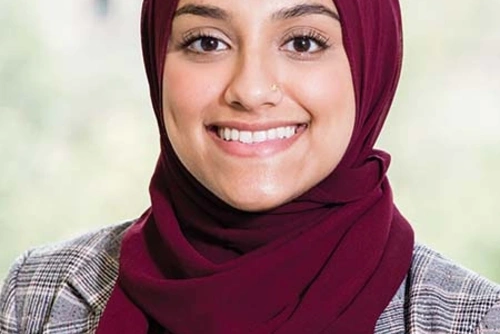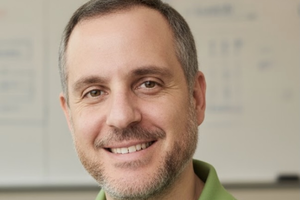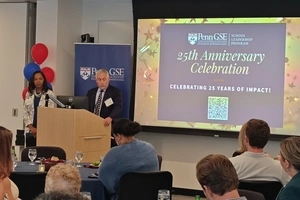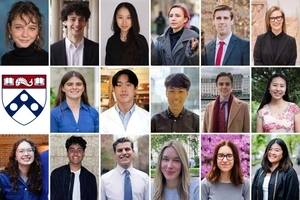By Stephanie Berrong
Growing up Palestinian in the Jaffa area of Tel-Aviv in Israel, Alamia Biro felt she was a girl between two worlds.
“I felt like I was always in between, but I also felt like this is a strength, because I can see two perspectives, and I can try to build a bridge between these two worlds,” says Biro, who is currently a student in the Education, Culture, and Society master’s program at Penn GSE.
At home with her family, she cherished Arab culture and the familiar rhythms of Islam. In the classrooms of the schools she attended, she encountered Western-based curricula taught in French, English, and later Hebrew, with classmates who hailed from countries around the world.
By the time she was in high school across the city, Biro had started to notice the socioeconomic and geographic disparities between herself and some of her classmates. “The school was almost an hour away from my home, and I used to commute to there and back to Jaffa,” she says. “Going to a very rich neighborhood in the center of Tel Aviv, I saw the very opposite of where I lived.”
She went on to earn her bachelor’s degree at Tel Aviv University and managed the Arab sector of Educating for Excellence, a nonprofit with centers across Israel dedicated to educating children on the socioeconomic and geographic periphery of the nation. Through this work she recognized even more obstacles for Arab-Palestinian students, including language barriers, poor teacher training, and a lack of formal educational support structures.
“I felt fortunate that my parents were aware of the importance of higher education,” says Biro, who saw through her work “how urgent it was for me to work in education and have an impact back home.” That realization led her to Penn GSE on a Fulbright Master’s Outreach fellowship. One of several awards granted by Fulbright Israel for study in the United States by Israeli citizens, the Outreach fellowship supports master’s studies for students of Arab or Ethiopian origin. Recipients are selected on the basis of academic excellence, leadership qualities, and ambassadorial skills to promote mutual understanding between the United States and Israel.
While their interests may vary, ECS students share a strong commitment to questions of access and equity and the ways in which politics and culture affect the kind of opportunities that learners have.
Penn GSE’s Education, Culture, and Society (ECS) master’s program is a one-year course of study that encourages students like Biro to examine the social, cultural, and historical aspects of education and prepare for careers in research, community advocacy, and educational or nonprofit administration. It allows students the flexibility to follow their own research interests—through a variety of interdisciplinary electives and the selection of a master’s thesis topic—while providing a strong foundation in scholarly methods. This openness and flexibility, Biro says, is one of the strengths of the program. “You are able to bring yourself to class and to your research.”
This flexibility is by design, explains Dr. Sigal Ben-Porath, professor and chair of the Literacy, Culture, and International Education division, which is home to the ECS program. “We want to provide a cohesive program with a lot of advising and flexibility that allows for people to shape their studies,” Ben-Porath says. For example, some students may be interested in immigrant communities or English language learners and how those characteristics affect educational paths. Some may be interested in systems of education in other world regions or in thinking about race or gender issues. While their interests may vary, says Ben-Porath, ECS students share a strong commitment to questions of access and equity and the ways in which politics and culture affect the kind of opportunities that learners have.
Another similarity among the students is that most have worked for a few years in related fields after earning their undergraduate degrees. “We all benefit from the vast amount of experience and knowledge that our students bring with them,” says Ben-Porath. “The students who join us are marvelous practitioners, professionals, and academics.”
Like Biro, ECS student Shahara Ahmed came to the program with a professional background. A native of New York City, Ahmed earned her bachelor’s degree at Wellesley College, where time spent observing classrooms for courses in education sparked her interest in the field.
“Those experiences really allowed me to appreciate the art and science of teaching,” she says. Although she earned teaching certification in Massachusetts, after graduation Ahmed was driven by a curiosity to learn about other facets of education. “When I’m interested in something, I want to know everything about it,” she says. She went on to explore the field through roles at the New York City Department of Education, where she recruited and enrolled young children in Head Start programs, and the independent Grace Church School, where she guided prospective high school students through the admissions process.

“I was developing so many curiosities and questions about how we can make the broad field of education more equitable,” she says. “I reached a point where I had more questions than I had answers, and it was at that point that I thought, ‘maybe grad school will help me answer some of these questions.’”
The ability to pursue her varied interests made ECS a dream program for Ahmed. “I loved the idea that I would have the flexibility to take courses in anything that I’m interested in, while also learning so much from my peers who are coming from such different backgrounds, and I’ve absolutely found that to be the case,” she says.
While she undertakes her studies, Ahmed is continuing to explore the field professionally, working part-time for the Advanced Education Research and Development Fund (AERDF). Putting her knowledge of teaching to use, she serves as an educator engagement fellow for AERDF’s EF+Math program, which aims to double the number of Black and Latinx students who are proficient in math in grades three through eight. “I support the educators who work with the research and development teams, ensuring that educators’ voices are elevated and incorporated into the research and development processes,” says Ahmed.
“I reached a point where I had more questions than I had answers, and it was at that point that I thought, ‘maybe grad school will help me answer some of these questions.’”
The ECS program’s approximately fifty students take their required courses together as a cohort, and many assignments rely on different forms of collaboration, including group projects and group presentations. The program’s faculty have expertise not only in education but also in a traditional discipline like anthropology, sociology, or philosophy. Both Biro and Ahmed say the depth and range of faculty expertise has been invaluable, particularly as they plan for their master’s theses, the capstone project of the ECS program.
Biro’s thesis investigates how higher education attainment can empower Arab-Palestinian women in Israel, an aim she hopes to pursue after graduation through advocacy and leadership. Ahmed’s thesis considers how to address racial inequity at independent schools. She has sought to find some answers by studying enrollment data, and she says she has learned through her experience in the ECS program that there is value in just asking the question.
“I think having these questions and being able to further quantitate what we know is so important for achieving equity,” says Ahmed, who is exploring roles in education technology and higher education. “Even if you can’t find the answer, just challenging what we see as the norm and considering different perspectives is still important.”
This article appeared in the Spring 2022 issue of The Penn GSE Magazine.
Media Inquiries
Penn GSE Communications is here to help reporters connect with the education experts they need.









